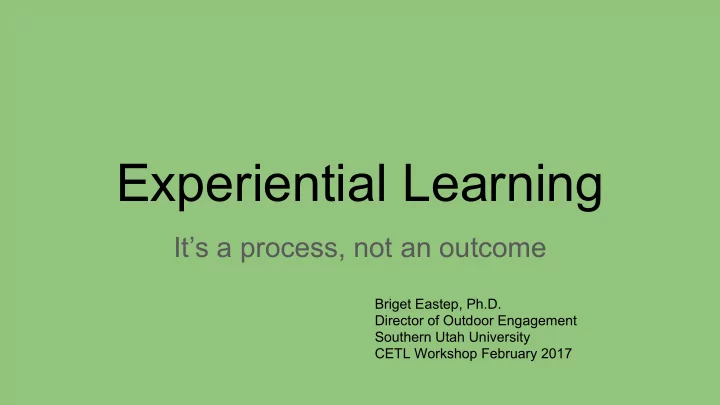

Experiential Learning It’s a process, not an outcome Briget Eastep, Ph.D. Director of Outdoor Engagement Southern Utah University CETL Workshop February 2017
Where we’ve been and where we’re going Integrative Learning Today, I hope you leave knowing Engaged Learning 1. What experiential learning is, and what it isn’t Experiential Learning 2. The experiential learning process 3. The role of the student and the role of the educator 4. Best practices in experiential learning 5. How to turn an activity, class, or course into an experiential learning process.
The experiential learning cycle (Kolb) 1. A person has an experience (What) 2. The person makes observations and reflects on the experience (what happened?) 3. The person forms judgments and connects to concepts about the experience (so what?) 4. The person has a new experience and acts, thinks, or believes differently than before (now what?) 5. The person has an experience…...
Traditional…………………………...Progressive Settings (Dewey, 1938) Classrooms? Seminars? Labs? Internships? Integrative learning activities? Community engagement learning activities? Global engagement learning activities? Outdoor engagement learning activities?
What does experiential education look like?
National Society for Experiential Education’s Principles of Good Practice 1. Intention 2. Preparedness and Planning 3. Authenticity 4. Reflection 5. Orientation and Training 6. Monitoring & Continuous Improvement 7. Assessment and Evaluation 8. Acknowledgement & Recognition
Roles in Experiential Learning Educator Student Intention Preparedness and planning Authenticity Reflection Orientation & Training Monitoring & Continuous Improvement Assessment & Evaluation Acknowledgement & Recognition
What do you teach? How do you teach? Activities 1. What is your purpose and desired outcomes? Classes 2. Are you prepared to teach? Are your students prepared to learn? Courses 3. Can you be in an authentic setting? 4. How and when will students reflect? 5. What orientation and training is needed to set students up for success? 6. How will students learning be monitored? How will students refine what they are doing along the way? 7. How will you assess/evaluate the learning? 8. How will you recognize and celebrate learning?
And in the end I hope you’ve considered or gained an understanding of 1. What experiential learning is, and what it isn’t 2. The experiential learning process 3. The role of the student and the role of the educator in experiential learning 4. Best practices in experiential learning 5. How to turn an activity, class, or course into an experiential learning process.
Recommend
More recommend